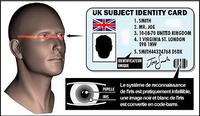-
TrendNew opportunities for biometrics and smart cards
The biometric microprocessor card market is growing by leaps and bounds; the microprocessor smart card market will hit 5.32 billion units shipped in 2010 and rise to 6.02 billion units in 2011; the growth owes to rising sales of e-ID cards, especially from the European residence permit, and growth in e-services for citizens
-
-
BiometricsIndia embarks on ambitious biometric project: 1.2 billion IDs

Yesterday India officially launched the world’s most ambitious biometrics project: assigning a unique 12-digit number to each of the country’s 1.2 billion people; the project, which seeks to collect fingerprint and iris scans from all residents and store them in a massive central database of unique IDs, is considered by many specialists the most technologically and logistically complex national identification effort ever attempted; the government says unique ID numbers will help ensure that government welfare spending reaches the right people, and will allow hundreds of millions of poor Indians to access services like banking for the first time
-
-
Biometric ID card contractors escape the U.K. government's axe
The new U.K. government has canceled the national biometric ID scheme and said that the National Identity Register will be destroyed, but companies with large biometric contracts — CSC, with a £385 million contract, whose Application & Enrollment System will be used to issue the passports, and IBM, with a £285 million contract for the National Biometric Identity Service — should emerge relatively unscathed, as their contracts will escape the government’s axe
-
-
Biometric national IDsIt is official: U.K. national ID cards scrapped within 100 days
The new U.K. government made it official; within 100 days, the biometric national ID scheme would scrapped, and the National Identity Register, the database that contains the biographic and biometric fingerprint data of card holders, would also be destroyed
-
-
U.K. second-generation ePassports project appears doomed
A clause in the coalition agreement between the Conservatives and the Liberal democrats call for chopping the second generation e-Passport scheme initiated be the departing Labor government; the U.K. biometric industry may not like this, but it is not yet clear what the impact on the industry will be; depending upon the water-tightness of contracts already signed with suppliers, the ID card project could still be fundamentally redesigned, rather than scrapped in its entirety; also, many other U.K. biometric projects will continue — IDENT1, Border Agency’s visa application program, eBorders program, and various Ministry of Defense documents that use the technology
-
-
U.S. remains vulnerable, 9/11 commission leaders say
Leaders of the 9/11 Commission lament the fact that more progress has not been made on several of the commission’s key recommendations — roadblocks to sharing intelligence, the inability of first responders to communicate on common radio frequencies, and the plethora of congressional committees that oversee DHS; Lee Hamilton calls for U.S. national ID
-
-
Critics: A U.S. national work ID would not solve the illegal immigration problem
Senators Charles Schumer and Lindsey Graham have proposed a mandatory Work ID for all working Americans; the bill they are proposing would require “all U.S. citizens and legal immigrants who want jobs to obtain a high-tech, fraud-proof Social Security card.”; critics say the scheme is too expensive and will be ineffective in curbing illegal immigration
-
-
Case studyBulgaria's biometric passport scheme
The introduction of ID documents with biometric data was a requirement for Bulgaria to join the European Union (EU) and was originally scheduled to come into effect before EU accession in January 2007, but was later rescheduled, with a final deadline in mid-2009; the implementation of the e-passports plan has not been a picture of efficiency and good management
-
-
Ferry giant refuses ID card
A husband and wife from Hull trying to take a ferry to Rotterdam for Christmas shopping were denied boarding after the ferry’s crew refused to accept the U.K.’s new biometric ID card as a means of identification; the couple applied for the card when it was offered on a voluntary basis to the public in Greater Manchester; the card is meant to allow travel across Europe as an alternative to a passport, but the crew, saying they had never seen such a card before, insisted on the couple producing their passports; since the couple had left their passports at home, they could not take their trip
-
-
More confusion about U.K. biometric ID scheme

The U.K. government’s controversial ID scheme called for making such an ID mandatory, but making the biometric IDs compulsory ran into problems owing to high costs, lack of public appetite, and concerns about the creation of a database state; the government has just announced that young people of between 16 to 24-year-old in London will be allowed to apply for voluntary ID cards, which will cost them £30
-
- All
- Regional
- Water
- Biometrics
- Borders/Immig
- Business
- Cybersecurity
- Detection
- Disasters
- Government
- Infrastructure
- International
- Public health
- Public Safety
- Communication interoperabillity
- Emergency services
- Emergency medical services
- Fire
- First response
- IEDs
- Law Enforcement
- Law Enforcement Technology
- Military technology
- Nonlethal weapons
- Nuclear weapons
- Personal protection equipment
- Police
- Notification /alert systems
- Situational awareness
- Weapons systems
- Sci-Tech
- Sector Reports
- Surveillance
- Transportation
Advertising & Marketing: advertise@newswirepubs.com
Editorial: editor@newswirepubs.com
General: info@newswirepubs.com
2010-2011 © News Wire Publications, LLC News Wire Publications, LLC
220 Old Country Road | Suite 200 | Mineola | New York | 11501
Permissions and Policies
Editorial: editor@newswirepubs.com
General: info@newswirepubs.com
2010-2011 © News Wire Publications, LLC News Wire Publications, LLC
220 Old Country Road | Suite 200 | Mineola | New York | 11501
Permissions and Policies
